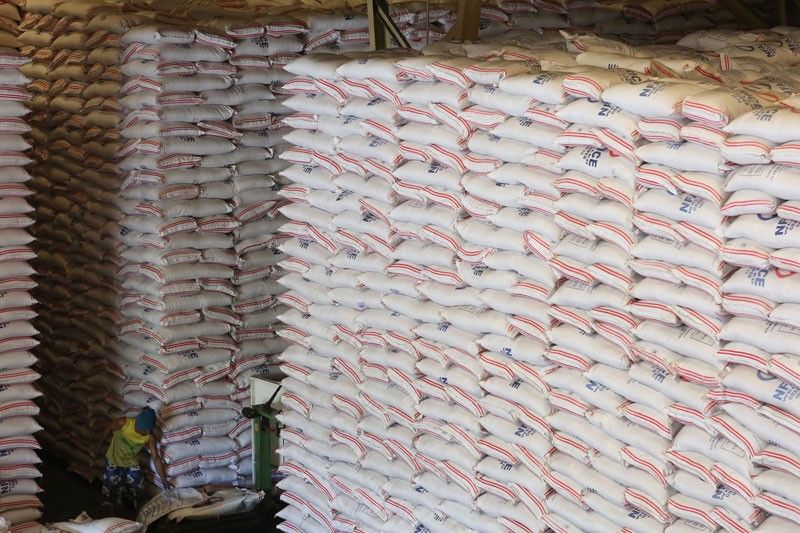1,000 National Food Authority employees to lose jobs

MANILA, Philippines — Close to a thousand employees of the National Food Authority (NFA) will lose their jobs as the agency will undergo restructuring following the enactment of the rice tariffication law.
During a meeting on the draft implementing rules and regulations (IRR) of Republic Act 11203 or the Rice Import Liberalization Act on Monday, it was determined that the NFA’s role would be limited to buffer stocking or procurement of local palay.
This means that when the law takes effect on March 5, all NFA workers directly involved in industry regulation, licensing and monitoring of wholesalers, millers and retailers will be removed as the agency is stripped of its power to distribute the staple.
“Based on our evaluation, there are about 400 people in the regulations and our operations are more than that. So it’s about close to 1,000 workers (who will lose their jobs),” NFA officer-in-charge administrator Tomas Escarez told journalists yesterday.
“We will be recommending that they can either remain, although their status is CTI or co-terminus with the incumbent. Or they can just avail of the compensation package, which we are certain most of them would,” Escarez said.
The NFA will no longer need that much manpower as its functions will only be limited to buffer stocking for emergencies and calamities.
“What we will do is just buy palay from local farmers good for 15 days and 30 days, we will be managing that for the whole year and doing that will not require a lot of people,” Escarez said.
The NFA has created a change management team that would handle the transition period between now and what the agency’s structure will be.
The interagency NFA Council has given the NFA up to 30 days to finalize its restructuring plan, which will be up for approval of the council.
The council is fast-tracking the draft of the IRR. Based on the law, a period of 90 days has been allocated for its completion.
Among the issues yet to be resolved is the exact tariff rates that would be imposed on importers from inside and outside the Association of Southeast Asian Nations (ASEAN) region.
The council is expected to meet again next week and a series of consultations with local farmers will be conducted.
Tariffication starts March 5
The Department of Finance (DOF) has clarified that the liberalization of rice imports and imposition of tariffs on imported rice should begin on March 5 as provided under the Rice Tariffication Law. The DOF said the shift from quantitative restrictions (QR) to tariffication of rice imports would start on March 5 and not on March 3, as earlier agreed upon by the NFA Council.
Finance Assistant Secretary and spokesman Antonio Lambino said this is in line with Republic Act 11203 or the Rice Tariffication Act, which provides that the law should become effective 15 days after its publication in the Official Gazette or in a newspaper of general circulation.
President Duterte signed the law on Feb. 14 and it was published in the Official Gazette on Feb. 18.
Lambino said the NFA Council assumed that the publication of the law was done on Feb. 15, which was why they agreed to impose tariffs starting March 3.
Corruption source?
Malacañang allayed fears that the Rice Competitiveness Enhancement Fund (RCEF) from rice tariff would become a source of corruption.
The Palace gave assurance that safeguards are in place to ensure that the rice fund, which will be created by the Rice Tarriffication Law, would be used properly.
Malacañang issued the statement after some farmers expressed worry that the fund would be misused like the P723-million fertilizer fund, which was allegedly diverted to the campaign funds of then president Gloria Macapagal-Arroyo in 2004.
The Rice Tarriffication Law provides an annual budget of P10 billion to the RCEF, which will protect the livelihood of local farmers.
Presidential spokesman Salvador Panelo said the government would not allow the RCEF to be misused.
Panelo said the agriculture secretary would be accountable and responsible for the RCEF and has been tasked to validate and update the master list of eligible beneficiaries, who include farmers, farm workers, rice cooperatives and associations.
He said the law requires the congressional oversight committee on agricultural and fisheries modernization to review the RCEF periodically.
Meanwhile, Butil party-list Rep. Cecilia Chavez is worried that the law would only worsen the sufferings of the agricultural sector, citing the “cartelized oil industry.”
“That’s what they did to oil and power. How can we be sure that the prices of rice will not rise in the future? Today, yes, it might go down, but what about in the future? That’s what I am worried about,” Chavez said.
“That’s what they were exactly saying before: let the market prices determine the price of the product,” Chavez told journalists at a briefing in the House media center yesterday.
“So what is happening now?” she asked, referring to the high cost of fuel.
Higher budget
Despite having most of its functions removed, the NFA is expecting a silver lining from the rice liberalization act, as a higher budget will be provided for the agency to ensure its buffer stocking role during calamities and emergencies.
The NFA Council agreed to include the NFA’s budget under the General Appropriations Act, which means higher allocation for the grains agency.
The NFA would adopt an optimal level of rice inventory equivalent to 15 to 30 days of national rice consumption under the tariff regime, effectively removing its function of issuing licenses, collecting fees and releasing import permits.
“Starting next year, the fund to be utilized will be sourced from GAA which is being approved by the Congress and Senate. What is in the IRR is that it will be supplemented by our corporate fund,” Escarez said.
Currently, the NFA’s annual budget is subsidized and most of its expenses for price stabilization are coming from its corporate fund.
“What we have right now is the budget only for palay procurement, relying on the P7 billion. But next year, we will be including the operating expenses. It will include the budget for 30 days and that is good because we will no longer have a hard time looking for funds,” Escarez said.
Draft IRR completed
The National Economic and Development Authority (NEDA) has completed drafting the IRR for the Rice Tariffication Act in anticipation of the signing of the bill into law.
Socioeconomic Planning Secretary Ernesto Pernia said NEDA has always been pushing for key reforms that will make the Filipino staple food accessible and affordable for everyone.
“We are confident that the full implementation of the law will have the resolute support of everyone,” Pernia said.
He said government agencies started preparing the IRR as early as January.
Technical working groups were created to discuss key provisions of the bill and provide inputs to the draft IRR.
The IRR drafting committee is composed of the NEDA, Department of Budget and Management, Department of Agriculture and other concerned government agencies.
The first draft of the IRR formulated during a two-day workshop last week was presented to the NFA on Feb. 18.
Pernia said the revised draft IRR would be subjected to public consultation in the coming days to ensure a smooth and timely transition to a new rice regime.
The draft IRR contains provisions on the removal of NFA’s regulatory powers and the streamlining of import requirements.
It also provides details on the necessary institutional arrangements that would enhance competitiveness and institute safety nets for local farmers affected by the removal of the QR on rice imports. – With Alexis Romero, Mary Grace Padin, Czeriza Valencia, Delon Porcalla
- Latest
- Trending



























